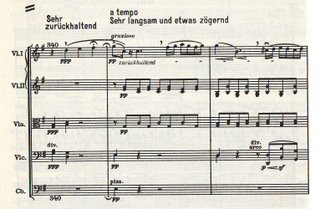A few months after moving to California, I looked out my window one sunny morning to find a hummingbird hovering magically in midair, its bill thrust deep into a flower. At that moment I learned something I hadn't known, which is that I had never in my life seen a hummingbird before. I knew perfectly well what they were, so it had never occurred to me to wonder whether I'd ever actually encountered one in the flesh; but as soon as I did I knew I could never have forgotten the experience. The same thing happened a few years later when I first read
Oedipus Rex — not feeling sure whether I had ever done so before, then quickly learning that I hadn't.
Now it's happened again, with a twist. Before
Friday's performance of Jake Heggie's new chamber opera
To Hell and Back, I could not have told you with any certainty whether I'd ever heard Patti LuPone perform. I don't pay much attention to the whole Broadway scene — not even the "no-man-trust-me-it's-actually-an-opera" arena inhabited by
Sweeney Todd and its ilk — so the odds were against it. Still, LuPone comes around here pretty regularly, and it wasn't out of the question that I could have encountered her in something or other that had then slipped my mind.
Not a chance. LuPone's performance on Friday was such a ghastly, slovenly, unspeakable mess that any prior acquaintance would have been branded into my consciousness forever. Once bitten, twice running very very fast in the opposite direction.
Because here's what they don't tell you about Patti LuPone:
She can't sing. I don't mean she can't sing
well, or attractively, or with nuance or interpretive alertness. I mean she can no more reproduce a given musical pitch than she can leap to the roof of the War Memorial Opera House, or pass a foot-long hot dog in one ear and out the other.
Heggie, God bless him, gave her a couple of tinny little Broadway numbers to tackle solo, and she delivered them credibly, if tunelessly, through her cranked-up microphone. But much of the rest of the piece involved her singing in tandem with an actual opera singer, the magnificent Isabel Bayrakdarian, and the results were unspeakable. You haven't winced until you've heard two vocalists — one who knows how to sing and one who doesn't — try to sing straightforward tonal harmonies together. Simple probability suggests that a handful of LuPone's notes must have been more or less in tune, but for the life of me I couldn't tell you which.
Sometimes a singer with less than impeccable technique will probe around a little before finding a note, but LuPone has a method that I've never heard before. She begins her search for a particular pitch in the right general vicinity; then she roams around aimlessly for a while, hoping to get closer; and finally, after a few unsuccessful stabs, she throws up her hands and settles on a wrong pitch — generally flat — and says, aah, the hell with it. And even then the horror isn't over, because if there's any time left on that note, she can't hold it — many a flat note got even flatter as LuPone lost interest in it.
Is this really the state of the art on the Great White Way? Can't be. The mind reels.

